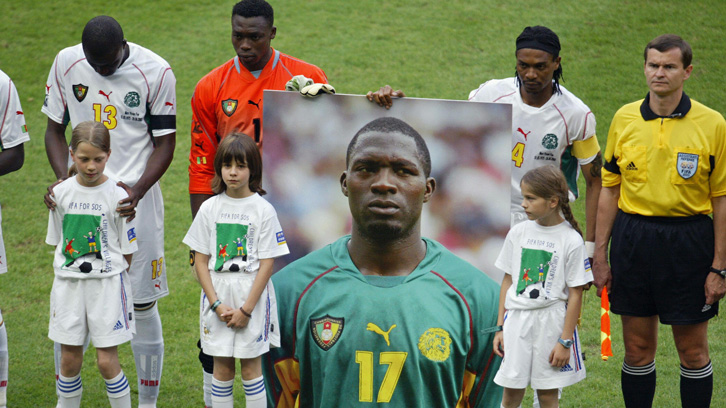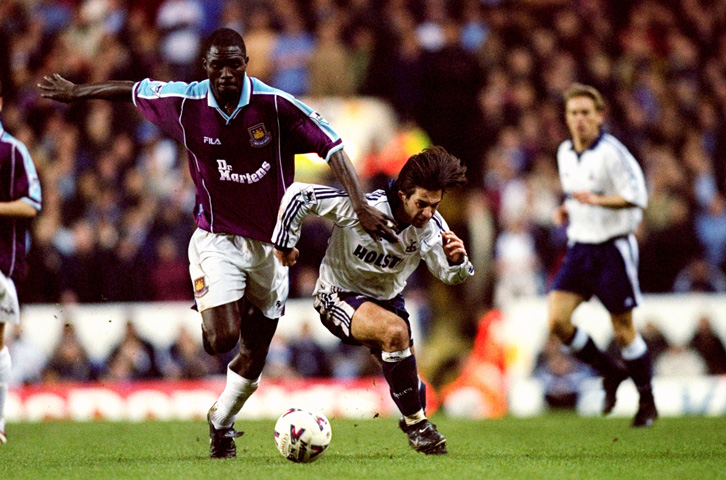
Fifteen years ago, former West Ham United midfielder Marc-Vivien Foe collapsed during Cameroon’s FIFA Confederations Cup semi-final tie with Colombia in Lyon, France.
Despite sustained attempts to resuscitate him, Foe died a short time later, leaving the football world in a state of shock and sadness. He was just 28.
An autopsy concluded that Foe’s death was heart-related, with evidence discovered of hypertrophic cardiomyopathy, a hereditary condition which causes a portion of the heart to be thickened and the muscle’s ability to pump blood effectively being reduced.
Foe is just one of dozens of sportspeople whose lives have been prematurely ended by heart condition, including former Newcastle United midfielder Cheick Tiote, Pablo Zabaleta’s Espanyol teammate Daniel Jarque, West Ham Academy graduate Mitchell Cole and, in March this year, Fiorentina’s Italy defender Davide Astori.
The FA and PFA-funded Cardiac Screening Programme was introduced in 1997, initially to screen Academy players at Premier League and EFL clubs. Now, every Premier League player must have at least one ECG (Electrocardiogram) and Echo scan in their medical folder, and the FA issued a recommendation that players are scanned for a second time at the age of 25 to increase the chance of picking up evidence of later onset cardiac conditions.
Sport is very healthy for body and mind, but sometimes people can have rarer conditions that can pose a risk during sport. Cardiac screening is designed to try and find most of these conditions
Head of Medical Richard Collinge
“We use cardiac screens to assess all player’s cardiac function through an ECG and Echo scan, which is effectively an ultrasound scan of the heart in real time to look at the muscular thickness of the heart wall chambers and the functioning of the valves and chambers within the heart,” explained West Ham’s head of medical Richard Collinge.
“These assessments, in conjunction with the findings of a questionnaire to screen for a positive family history or symptoms in the individual, will dictate whether a cardiac stress test on a bike or treadmill is required to see how the heart responds under conditions of exercise. A cardiac MRI and follow up with a sports cardiologist may also be required in certain players.”
“Hypertrophic cardiomyopathy is the condition which most supporters have heard of, but other conditions such as Commotio cordis (disruption of the heart rhythm caused by a blow to the chest directly over the heart) and Myocarditis (inflammation of the heart muscle) can also affect footballers, as they can non-sportspeople.
“Sport is very healthy for body and mind, but sometimes people can have rarer conditions that can pose a risk during sport. Cardiac screening is designed to try and find most of these conditions.”

At West Ham, screening services are provided by the Club’s official private hospital Spire London East and Cardiac Risk in the Young (CRY), overseen by cardiology specialists Professor Sanjay Sharma and Dr Aneil Malhotra from St George's University Hospital in London.
Dr Malhotra explained that with around one in every 300 people affected by a pre-existing cardiac condition, the Hammers’ pro-active approach to the screening programme shows how seriously the Club takes the health and wellbeing of its players.
Every prospective new signing is screened, while tests are also carried out on the first-team, U23 and U18 squads at the start of pre-season training.
Should any abnormalities come to light during the screening process, players will informed immediately about the risks and their treatment can be continually monitored by medical experts.
With 80 per cent of cases showing no prior symptoms, actively going out and screening footballers becomes more important, because otherwise their conditions can go undetected
Dr Aneil Malhotra
“Working with CRY, the FA runs one of largest screening programmes in Europe for elite athletes,” Dr Malhotra explained. “The idea is to detect silent heart diseases which can cause sudden death in training or on pitch.
“Through our research, we have found that 0.4 per cent (1 in 300) of young people have a cardiac condition which can predispose them to cardiac arrest during exercise, which amounts to a significant number of the total number of footballers, professional and amateur, in this country.”
“As was the case with Marc-Vivien Foe, we can see that the sudden death of footballers can be very emotive and can devastate communities.
“With 80 per cent of cases showing no prior symptoms, actively going out and screening footballers becomes more important, because otherwise their conditions can go undetected.
“We are making great progress in understanding footballers’ hearts, but there is more work to be done.”
Dr Malhotra said West Ham’s commitment to the screening of its footballers at all levels was to be applauded and urged other clubs to follow the Hammers’ lead.
“The Club screens both youth team and first team players on regular basis and maintains an avid and active interest in the programme,” he confirmed.
“No test is 100 per cent accurate, but West Ham are one of the leading clubs in carrying out screening to help maintain safety of its athletes, both in terms of screening and in the defibrillator facilities at their training facilities, which is very good.”